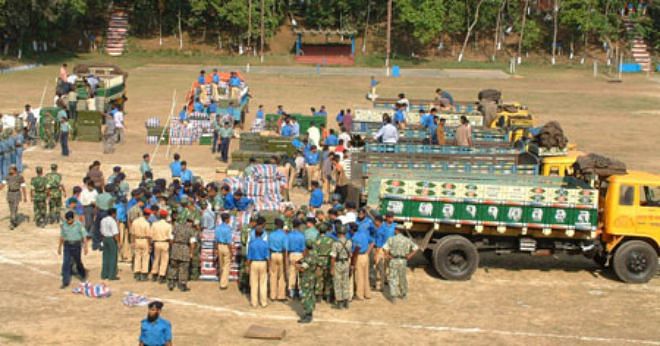Chittagong arms haul in retrospect

Today, the special court trying the two cases related to the 10 truckload arms haul in 2004 will announce its verdict, i.e. if there is no intervention from the Supreme Court that the defense might seek. The defense prayer to cross-examine the first investigator of the case was turned down by the High Court on Monday.
It has taken rather an inordinate length of time to conclude a case that has serious strategic, security and regional and bilateral implications. Although the trial itself took about four years, one is not surprised that the investigation process was perhaps deliberately distorted so that the entire process was derailed and the truth did not come out. In fact, the court had to order a reinvestigation since the first investigation had failed to come out with answers to several important questions related to the matter.
It is not surprising that the process took a decade to complete the first phase of trial given the background and the involvement of the state machinery in the process. It was providence that the matter was discovered while the trucks, that were to carry the consignment to whatever destination it was meant for, were being loaded. And from what one can make out from the media account, the discovery was also accidental. The Ansar guard on duty was not briefed that such a consignment was to pass that way to which he should turn a blind eye.
There is very little doubt that there was administrative collusion in the transshipment. As we said in 2004, the fact that the CUFL jetty was being used as the offloading point, under the nose of the police, if the press reports are to be believed, is a clear indication of that. The fact that these people chose to use a government facility, and that too a key point installation (KPI), to unload such a huge quantity of arms and ammunition, points to some collusive arrangements. Such a large operation cannot be undertaken without a 'guarantee' of immunity. Given the fact that the operation did not involve only the unloading of this consignment but also an equally risky task of delivering it to the 'consignee,' it is possible only with a guarantee of sorts.
Since the possibility of Bangladesh being a destination of the seized consignment is negated by the 'demand' and 'supply' factor as well as the market's 'utilisation capacity rate' there is little doubt that the destination was not Bangladesh. And we had ten years ago in this very column through process of elimination in the list of destination countries and separatist groups, fixed ULFA as the only possible recipient of the consignment.
While in April 2004 we had posited three questions with regard to the arms haul e.g., 'from, for and by' whom were these weapons, and we had answered the latter two in some details then, the question we should now ask is 'what for' this course of action.
One finds it difficult to rationalise a policy which in the long run would have boomeranged on the country putting its security at great risk. One wonders whether it was a state policy derived from detailed strategic analysis to support a dissident group of a neighbouring country engaged in armed struggle against the centre. And what was the strategic dividend the schemers wanted to derive for Bangladesh from this policy? One wonders too if this undertaking was with the full knowledge of the central authority in Dhaka given that that there was a government within the government at that time. And what benefit would have accrued to Bangladesh if this policy stemmed from the need to connive with a third country to destabilise another country? And was it a means of employing indirect leverage on India quite like what it tried to employ in the eighties through the Chakma insurgents?
One is sure that the trial court in passing its judgment will consider all relevant facts and figures in handing out the punishments and those involved in the matter will receive due comeuppance, but we are at a loss to rationalise why the state machinery was involved in a dangerous game whose outcome could have been disastrous for Bangladesh. And thus perhaps it is appropriate that we revisit the matter if only to establish the dangerous futility of such a policy. There are also compelling reasons that the policy makers and people in high places take lesson from the incident. And one would hope too that the enquiry and the trial would specifically reveal the money source for such a large consignment of weapons.
The writer is Editor, Op-Ed and Defence & Strategic Affairs, The Daily Star.

 For all latest news, follow The Daily Star's Google News channel.
For all latest news, follow The Daily Star's Google News channel. 



Comments